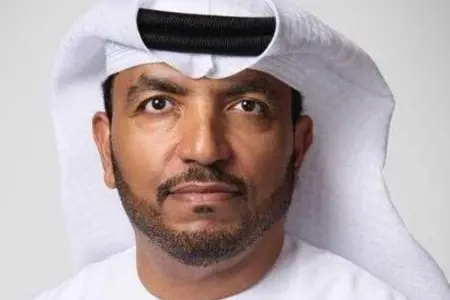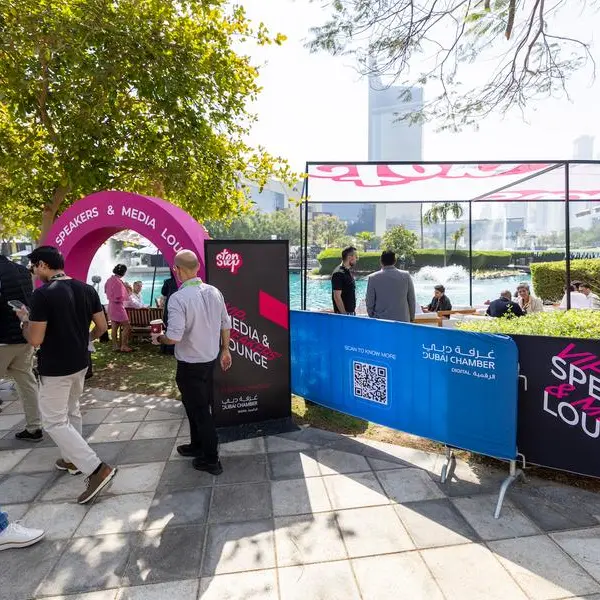PHOTO
Omar Al-Suwaidi: 1,294 standards and 632 technical regulations serving the food and beverage sector
Farah Al-Zarouni: Introducing the industrial sector to the role of specifications and metrology that supports the quality of products and raises their competitiveness
Dubai - The Ministry of Industry and Advanced Technology organized an introductory workshop for the food industries sector and the national authorities of metrological control. The workshop aimed to raise awareness about the legal metrology units that are applied in the food and beverage industry sector, and their impact on food and beverage production and product quality.
Part of the Ministry’s program to enhance the familiarization with and awareness of metrology activities and services, the virtual workshop was attended by representatives of the public and private sectors, including the Abu Dhabi Quality and Conformity Council, the Dubai Central Laboratory of the Dubai Municipality, Economic Development Departments, conformity assessment authorities, and food and beverages producers.
The workshop included presentations on the national strategy for industry and advanced technology, “Operation 300bn”, as well as the use of internationally compatible metrology units and their impact on raising national production efficiency, and enhancing the competitiveness and global acceptance of the UAE’s food production sector.
National Strategy
His Excellency Omar Suwaina Al-Suwaidi, Undersecretary of the Ministry of Industry and Advanced Technology, stressed that building the knowledge capabilities of partners in the private sector is in line with the strategic objectives of the Ministry, especially in the establishment of a suitable and attractive business environment for local and international investors in the industrial sector and enhancing the regional and global competitiveness of local manufacturers. To this end, the Ministry has issued 1,294 standards and 623 mandatory technical regulations to partners in the industrial sector through the Ministry’s website.
Al-Suwaidi added that the Ministry is working to integrate and involve representatives of all sectors in the technical committees concerned with setting standards, legislations and technical regulations in order to consolidate the institutional partnership approach and provide specifications according to the highest applicable international standards.
His Excellency noted that the UAE is the first country to update legislation related to metrology units based on the latest developments in the international system of metrology by member states, which collectively signed The Metre Convention in the International Bureau of Weights and Measures in 2018.
The UAE participated in the vote on the resolution as a key member of the International Bureau of Weights and Measures (BIPM), which resulted in the redefinition of four basic units of measurement out of the seven included in the International System of Units, namely the kilogram (weight), the kelvin (temperature), the ampere (electric current) and the mole (material quantity).
Food Industry
For her part, His Excellency Farah Ali Al-Zarouni, Acting Assistant Undersecretary for the Specifications and Legislation Sector at the Ministry of Industry and Advanced Technology, confirmed that the workshop aimed to educate workers in the food and beverage industries sector about the importance of applying modern measurement systems to improve productive efficiency and enhance the competitiveness of Emirati products in global markets.
She added that the workshop discussed the units of the international system of measurement, ways of writing them, their symbols, and the abolition of units of measurement not universally accepted, which negatively affect the acceptance of national products outside the country.
Al-Zarouni stated that the Ministry issues and reviews many legislations aimed at developing the infrastructure of metrology in the country, such as the National Measurement System, technical regulations for medical and environmental measurements, in addition to legal metrology programs that are implemented in coordination between the ministry and its strategic partners, including the regulation of scales, fuel meters, taxi meters, packaged products and commercial meter measurements.
Her Excellency emphasized that these programs contribute significantly to raising confidence in the measurements used in the industrial sector and commercial exchanges in the country. She added that the country is also working to develop modern legislation that keeps pace with the industrial development in UAE to cover chemical, electronic and digital measurements in industry.
Accuracy of the tools in Abu Dhabi
For his part, His Excellency Khalaf Al Mazrouei, Executive Director of the Markets and Consumer Services Sector at the Abu Dhabi Quality and Conformity Council, stressed that the Council’s participation in the workshop is in line with the vital role of the Abu Dhabi Quality and Conformity Council to cooperate with the Ministry of Industry and Advanced Technology in raising the technical capabilities of factories and companies in the country, based on the authorization agreement signed between the Ministry and the Council.
Al Mazrouei explained that the council’s vision and mission are in line with the objectives of the Abu Dhabi Plan to build a strong and competitive economy. The vision focuses on upgrading the quality infrastructure, which will enable the Emirate of Abu Dhabi to excel globally, while the mission is to lead, facilitate and develop a quality infrastructure in the Emirate which is integrated and highly efficient at the global level, and promote a culture of quality, industrial development, competitiveness and consumer safety.
He added: “The Council is also working to ensure the accuracy of legal measurement tools and the correctness of the quantity in pre-packaged goods and their compliance with their specifications and requirements. This is achieved through specialized technical work-teams, which also ensures that the correct units of measurement are used in the emirate. The council has participated in several campaigns to change the units of measurement, including the campaign to replace the yard unit with the meter unit and the campaign to replace the tula unit with the gram and milliliter unit.
For its part, the Dubai Central Laboratory of Dubai Municipality highlighted the role of the municipality in controlling legal measurement tools under the authorization agreement issued by the Ministry of Industry and Advanced Technology. This supports the development of quality infrastructure in the Emirate of Dubai and the UAE in general and helps guarantee optimum results in the provision of correct, accurate and reliable measurements in accordance with the best practices of international standards.
The presentation prepared by the Dubai Central Laboratory touched on the program for controlling the quantity of the product in pre-packaged goods in local factories, which would protect the rights of consumers on the one hand, and the rights of manufacturers, distributors, importers and the national economy on the other.
He referred to the verification methods and the correct presentation of measurement units based on Technical Regulation No. 3 of 2016 issued by the Ministry of Industry and Advanced Technology. These aim to verify the quantity of the product in pre-packaged goods both from local food factories and importers.
Information Box:
How the process of controlling the quantity of products in pre-packaged goods is done?
The process is done in two ways:
- Market survey method in general. It targets sales outlets, markets and supermarkets. The aim is to see the largest number of product types offered directly to the consumer, where the quantity of the product inside the package and the label of the product is verified in accordance with the UAE technical regulation for pre-packed packages No. 3 of 2016.
In the event that violations are found, an inquiry is made about the main supplier or factory, and the transition to the second stage or method will be made
- The quantity of the products, whether in terms of weight or volume, is verified inside the factory or at the main agent or the importer, where sampling procedures are applied extensively and from the production line or from the main warehouses
In the event that violations are proven, the products will be seized and prevented from being sold to consumers, and radical corrective measures will be taken.
Manufacturers, suppliers, traders and consumers can access detailed information about the digital services provided by the Ministry of Industry and Advanced Technology, by visiting the following link:
© Press Release 2021
Disclaimer: The contents of this press release was provided from an external third party provider. This website is not responsible for, and does not control, such external content. This content is provided on an “as is” and “as available” basis and has not been edited in any way. Neither this website nor our affiliates guarantee the accuracy of or endorse the views or opinions expressed in this press release.
The press release is provided for informational purposes only. The content does not provide tax, legal or investment advice or opinion regarding the suitability, value or profitability of any particular security, portfolio or investment strategy. Neither this website nor our affiliates shall be liable for any errors or inaccuracies in the content, or for any actions taken by you in reliance thereon. You expressly agree that your use of the information within this article is at your sole risk.
To the fullest extent permitted by applicable law, this website, its parent company, its subsidiaries, its affiliates and the respective shareholders, directors, officers, employees, agents, advertisers, content providers and licensors will not be liable (jointly or severally) to you for any direct, indirect, consequential, special, incidental, punitive or exemplary damages, including without limitation, lost profits, lost savings and lost revenues, whether in negligence, tort, contract or any other theory of liability, even if the parties have been advised of the possibility or could have foreseen any such damages.



















